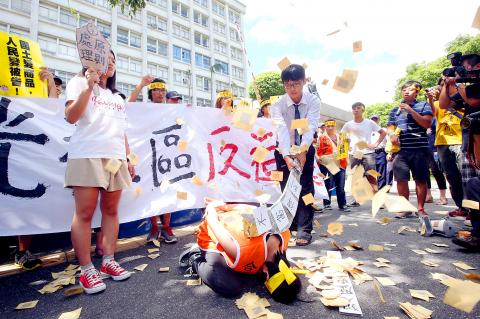Huaguang Community (華光社區) residents and the Ministry of Finance yesterday failed to reach an agreement on the compensation that a court has asked residents to pay for “illegally benefiting” from “illegal occupation” of government land.
“According to current laws, these residents may be considered ‘illegal,’ but the government should look into the historic context, the issue should be resolved through arbitration by a third party, a lawsuit should be the last resort,” Ho Yu-lun (何友倫), a student activist, said during a protest outside the ministry in Taipei.
Ho was referring to the Ministry of Justice’s pursuit of compensation — millions of NT dollars — from Huaguang Community residents, as a court ruled that they had illegally occupied government land.

Photo: CNA
However, the residents and their supporters argue that the Huaguang Community issue is much more complicated, since many of the residents were low-ranking soldiers who fled to Taiwan with the Chinese Nationalist Party (KMT) regime following its defeat by the Chinese communist Party and they were unofficially allowed to build homes on the land because the government were unable to resettle them.
Although the land belongs to the Ministry of Justice, the residents have paid property taxes, and are provided utilities and allowed to sell their houses.
A Huaguang Community resident surnamed Cheng (鄭), said the government should show mercy to the residents and lift their burden by voiding the compensation claim.
“With the millions of NT dollars of compensation burdening us, those residents who were middle class are now in poverty, while those who were already economically disadvantaged are now deeper in debt,” she said.
Another resident surnamed Lin (林) said her family’s debt had grown from about NT$2 million (US$66,700) a few years ago to NT$7 million.
National Property Administration Deputy Director-General Pian Tzu-shu (邊子樹), who met with the protesters, insisted that the government is acting according to the law and that it cannot do anything to help.
Representatives of the residents were invited to negotiate with officials inside the ministry, but the meeting was called off within half an hour because the two sides could not reach an agreement.

CHANGING LANDSCAPE: Many of the part-time programs for educators were no longer needed, as many teachers obtain a graduate degree before joining the workforce, experts said Taiwanese universities this year canceled 86 programs, Ministry of Education data showed, with educators attributing the closures to the nation’s low birthrate as well as shifting trends. Fifty-three of the shuttered programs were part-time postgraduate degree programs, about 62 percent of the total, the most in the past five years, the data showed. National Taiwan Normal University (NTNU) discontinued the most part-time master’s programs, at 16: chemistry, life science, earth science, physics, fine arts, music, special education, health promotion and health education, educational psychology and counseling, education, design, Chinese as a second language, library and information sciences, mechatronics engineering, history, physical education

DEADLOCK: As the commission is unable to forum a quorum to review license renewal applications, the channel operators are not at fault and can air past their license date The National Communications Commission (NCC) yesterday said that the Public Television Service (PTS) and 36 other television and radio broadcasters could continue airing, despite the commission’s inability to meet a quorum to review their license renewal applications. The licenses of PTS and the other channels are set to expire between this month and June. The National Communications Commission Organization Act (國家通訊傳播委員會組織法) stipulates that the commission must meet the mandated quorum of four to hold a valid meeting. The seven-member commission currently has only three commissioners. “We have informed the channel operators of the progress we have made in reviewing their license renewal applications, and

The High Prosecutors’ Office yesterday withdrew an appeal against the acquittal of a former bank manager 22 years after his death, marking Taiwan’s first instance of prosecutors rendering posthumous justice to a wrongfully convicted defendant. Chu Ching-en (諸慶恩) — formerly a manager at the Taipei branch of BNP Paribas — was in 1999 accused by Weng Mao-chung (翁茂鍾), then-president of Chia Her Industrial Co, of forging a request for a fixed deposit of US$10 million by I-Hwa Industrial Co, a subsidiary of Chia Her, which was used as collateral. Chu was ruled not guilty in the first trial, but was found guilty

Taiwan People’s Party (TPP) Chairman Huang Kuo-chang (黃國昌) yesterday appealed to the authorities to release former Taipei mayor Ko Wen-je (柯文哲) from pretrial detention amid conflicting reports about his health. The TPP at a news conference on Thursday said that Ko should be released to a hospital for treatment, adding that he has blood in his urine and had spells of pain and nausea followed by vomiting over the past three months. Hsieh Yen-yau (謝炎堯), a retired professor of internal medicine and Ko’s former teacher, said that Ko’s symptoms aligned with gallstones, kidney inflammation and potentially dangerous heart conditions. Ko, charged with